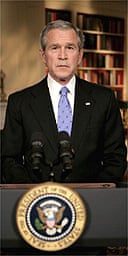George Bush this morning ordered 21,500 more US troops to Iraq to try to quell sectarian violence, but promised a war-weary public that "America's commitment is not open-ended".
Only months after he declared that the US could win the war in Iraq, Mr Bush, appearing somewhat chastened, admitted that the US strategy had failed, and that the administration had not anticipated the eruption of sectarian violence that now posed the gravest danger to Iraq.
In a rare admission for a president famously averse to expressing regret, he fully accepted responsibility for that failure.
"The situation in Iraq is unacceptable to the American people - and it is unacceptable to me," he said in a prime-time address from the White House. "Where mistakes have been made the responsibility rests with me."
The speech was a last-ditch attempt by Mr Bush to persuade a sceptical Congress to remain committed to a deeply unpopular war. It puts Mr Bush on a collision course with the new Democratic majority which opposes a troops increase - as do a number of Republican senators. Congress is set to vote next week on the troop deployment.
Under the new plan, the US will increase the number of troops in Iraq, which currently stands at 132,000, by 21,500. The majority of the new force will be stationed in Baghdad and embedded with Iraqi units while some 4,000 marines will be sent to western Anbar province to fight Sunni insurgents.
The plan is the third attempt to stabilise the Baghdad area, the scene of 80% of sectarian violence in Iraq. Mr Bush said the new strategy would work where other plans had failed because of the increased force levels. "This time, we will have the force levels we need to hold the areas that have been cleared," he said.
Mr Bush claimed Washington had secured a new commitment from the Iraqi prime minister, Nouri al-Maliki, that there would be no sectarian or political interference as the expanded troops root out the militias responsible for the violence, including the followers of the radical cleric, Moqtada al-Sadr.
If Mr Maliki did not uphold the pledge, he risked losing US support, Mr Bush warned. "I have made it clear to the prime minister and Iraq's other leaders that America's commitment to Iraq is not open-ended," the president said.
The long-awaited address has been widely seen as a defining moment in Mr Bush's presidency, and the new strategy could well determine whether he leaves the White House two years from now as a leader who can claim some success in Iraq, or only abject failure. With an eye to that legacy, Mr Bush was careful to acknowledge the Iraq Study Group led by former secretary of state James Baker, although the new plan ignores its central recommendation of a phased withdrawal.
Public opinion is also running in favour of a withdrawal but Mr Bush argued that such a course would create even more casualties in a war that has killed about 3,000 US forces since March 2003. "To step back now would force a collapse of the Iraqi government, tear that country apart, and result in mass killings on an unimaginable scale," Mr Bush said. "If we increase our support at this crucial moment, and help the Iraqis break the current cycle of violence, we can hasten the day our troops begin coming home."
The administration is also rolling out an aggressive public relations campaign with Mr Bush scheduled to visit US troops in Fort Bening, Georgia, and the secretary of state, Condoleezza Rice, and Pentagon chief, Robert Gates, trying to sell the new policy to senators.
In his speech, Mr Bush was confident that the US would still be able to emerge successful from Iraq, but the parameters of that victory were drastically reduced from the one envisaged when the war first began. "Victory will not look like the ones our fathers and grandfathers achieved. There will be no surrender ceremony on the deck of a battleship," he said. "A democratic Iraq will not be perfect."
